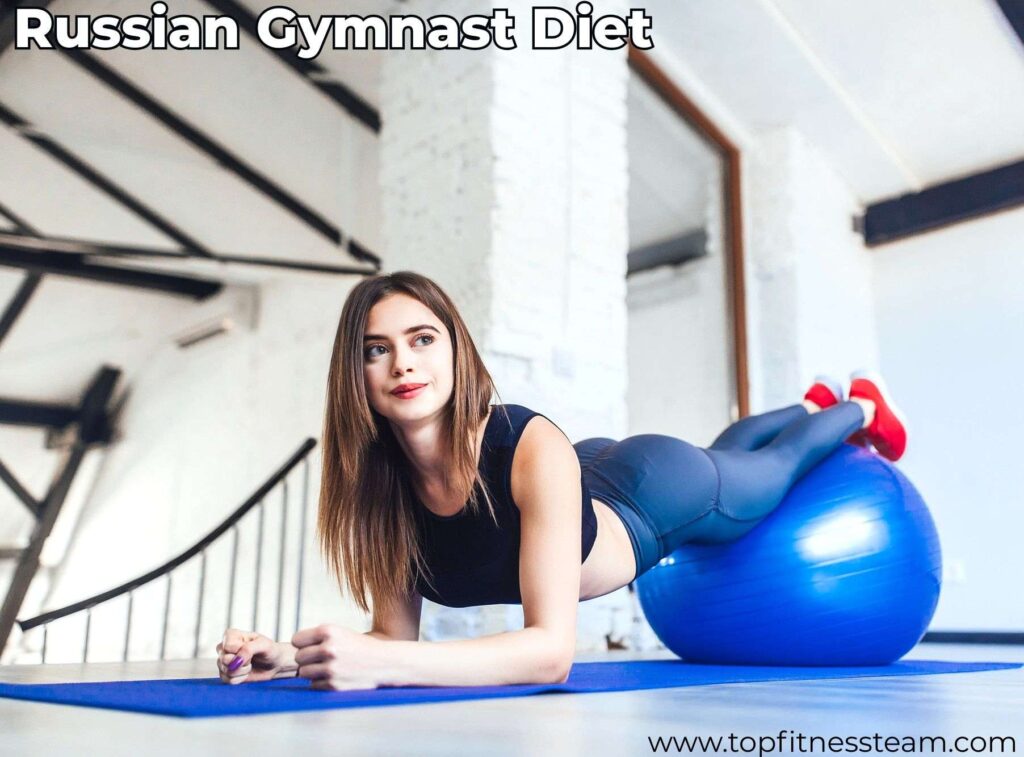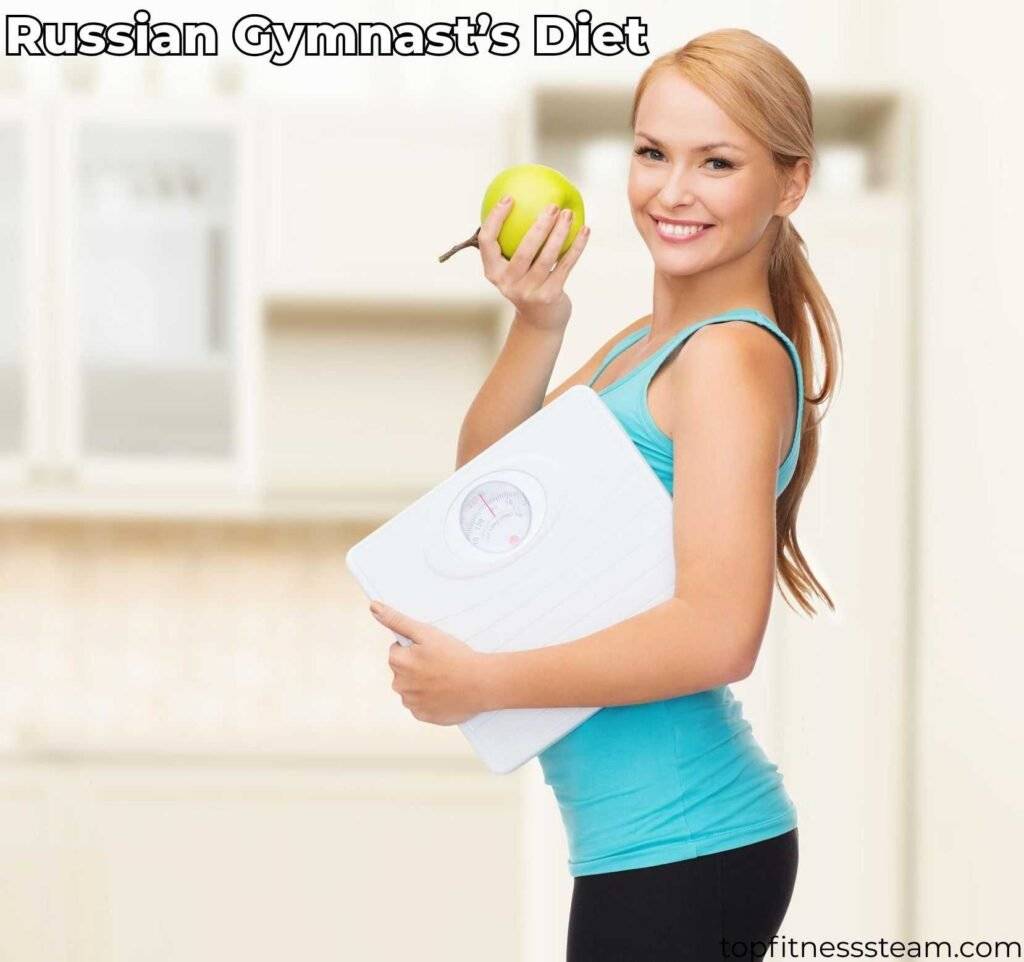
Hello everyone, Top Fitness Team is here. This article will tell you about the Russian Gymnast Diet.
Introduction
The world of gymnastics demands strict training and careful attention to diet. Russian gymnasts, celebrated for their incredible feats, follow a specialized diet that optimally fuels their bodies for peak performance.
This article explores the nuances of the Russian gymnast diet, highlighting its role in improving athletic abilities. Yet, it is essential to note that diets vary based on individual needs and should always be tailored with professional guidance.
Basics of Russian Gymnast’s Diet

The cornerstone of a Russian gymnast’s diet is balancing macronutrients (proteins, carbohydrates, fats) and micronutrients (vitamins, minerals) to meet their high energy requirements.
Protein is essential for muscle repair and growth, carbohydrates provide the necessary energy for training, and fats are vital for hormonal fitness and energy storage.
Hydration is another critical aspect. It aids in performance, recovery, and overall fitness. Russian gymnasts typically follow a diet rich in whole foods, with controlled portions, to maintain an optimal weight for gymnastics.
Typical Meals and Foods
A typical day in the life of a Russian gymnast starts with a nutritious breakfast, such as oatmeal or eggs, paired with fruits for natural sugars and fiber.
Lunch and dinner often consist of lean meats like chicken or fish, a variety of vegetables, and complex carbohydrates like brown rice or whole-grain pasta.
Snacks are equally essential and usually include fit options like nuts or yogurt to sustain energy levels throughout the day.
Cultural Influences on the Russian Gymnast Diet
Russian culinary traditions significantly influence the diets of these athletes. Traditional Russian dishes, such as borscht (a beet soup) or kasha (a buckwheat dish), are often mixed into their meals, albeit in forms more suitable for muscular nutrition.
These foods provide a taste of home and offer a balanced mix of nutrients essential for a gymnast’s diet.
Dietary Challenges and Solutions
Gymnasts often face dietary challenges like keeping specific body weights and managing energy levels throughout intense training sessions.
Russian gymnasts address these challenges through strategic meal planning, portion control, and sometimes the inclusion of dietary supplements under skilled care.
This careful balancing act ensures they meet their nutritional needs without compromising their performance or health.
Training and Diet Synchronization
The synchronization of diet with training is vital. Russian gymnasts’ diets are meticulously aligned with their training schedules and intensity. For instance, carbohydrate intake is often increased during intense training to provide additional energy.
Also, dietary considerations are significant in injury prevention and recovery, with certain nutrients highlighted to aid these processes.
Expert Insights
Insights from nutritionists and coaches who work with Russian gymnasts reveal a nuanced approach to diet in sports. These professionals highlight the importance of a personalized diet plan that caters to the individual needs of each athlete.
Comparing the Russian gymnast diet with those of athletes from other countries highlights diverse approaches to sports nutrition, each tailored to specific athletic demands.
Summary
The Russian gymnast diet is a well-orchestrated blend of nutrition and cultural influence tailored to meet the demanding needs of elite athletes. It highlights the importance of a balanced and personalized diet in gaining top athletic performance.
While this diet offers valuable insights, individuals must confer with nutrition experts to tailor a diet plan that suits their needs.
My Final Thoughts
The Russian Gymnast Diet, known for its strictness and high discipline, highlights lean proteins and minimal carbohydrates, aiming for weight control and improved physical performance.
While effective for specific athletic goals, its rigid nature may only suit some, mainly due to potential nutritional imbalances. Considering individual fitness needs and consulting a nutritionist before assuming such specialized diets is essential.
For Further reading on the effectiveness of the Russian gymnast diet, readers may find the discussion on Quora insightful. Also, exploring whole foods nutrition and wellness can be further increased by visiting The Grateful Grazer.
FAQs
Q: What is the best diet for a gymnast?
Ans: A balanced diet rich in carbohydrates, proteins, and fats, tailored to their energy and nutritional needs.
Q: How many calories should a gymnast eat per day?
Ans: Female gymnasts typically need 2,000 to 2,500 calories daily, while male gymnasts may require 2,500 to 3,000 calories.
Q: What is the best protein for gymnasts?
Ans: Lean meats, fish, poultry, dairy, legumes, and plant-based proteins like tofu are ideal for gymnasts.
Q: What does a male gymnast eat in a day?
Ans: Various whole grains, lean proteins, fruits, vegetables, and healthy fats are distributed across multiple meals.
Q: What does Simone Biles eat daily?
Ans: It is likely a well-balanced diet with a mix of carbohydrates, proteins, and fats, plus fruits and vegetables.
Thanks.
1 thought on “Russian Gymnast Diet Explain”